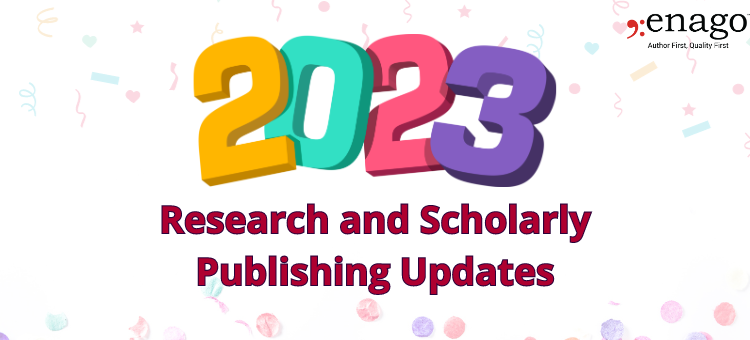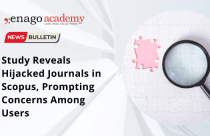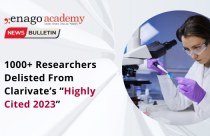2023 in Review: Important updates in research and scholarly publishing

As we bid adieu to 2023, an eventful year filled with monumental shifts in the world of scholarly publishing, we are thrilled to take you on the journey through the most notable events, milestones, and challenges faced by the scientific community.
2023 was undoubtedly defined by the concerted actions against potential threats of Artificial Intelligence (AI) and instances of scientific misconduct, to fortify the bedrock of academic integrity. As we steer into 2024, it’s essential to look back at the significant happenings in the industry and grasp their implications for the future.
2023 was the year of:
1. Upholding Academic Integrity
a. Web of Science Delists Over 50 Journals
Although 2023 witnessed an unfortunate surge in retractions and an increase in scientific misconduct, the community ensured resistance against it. The reasons for these retractions included data-manipulation and a compromised peer review process, among others. Furthermore, in March, Web of Science took a bold step by delisting over 50 flagged journals, signaling its commitment to maintaining a high-quality scholarly record.
b. Clarivate Releases its 2023 List of Highly Cited Researchers
Clarivate unveiled its 2023 list of 7,125 Highly Cited Researchers™ across various fields, recognizing 6,849 influential individuals globally. The exclusion of over 1000 researchers from its final list came as a shock to the community.
c. Study Reports Over 67 Hijacked Journals in Scopus
A study published in November by Anna Abalkina revealed 67 hijacked journals in Scopus, prompting concerns within the community. Although some journals included legitimate work, instances of plagiarism, fabrication, or publication without peer review were reported. The study called for coordinated action within the scholarly publishing ecosystem to counteract hijacked journals.
d. Enago Academy Releases the Research Ethics Survey
In an effort to address the root causes of misconduct, Enago Academy released a Research Ethics Survey in November, to promote researcher awareness and capture their understanding of research ethics and compliance. So far over 500 researchers have already participated in the survey, sharing their opinions on adherence to ethical standards, challenges faced, effectiveness of training programs, and ethical aspects of data management in academic and research settings, to aid the development of policies by industry stakeholders that help researchers to remain ethically compliant.
Based on our preliminary analysis of the survey responses, the scholarly world is divided in its opinion of having universal standard guidelines for research ethics and compliance, the ways of addressing ethical guidelines challenges posed by AI integration in research, and several other key aspects necessary to uphold research integrity.
It’s time you add value with your opinions. The survey is about to end soon. Participate now to make your word count and stand a chance to win rewards such as Amazon vouchers, feature in an exclusive interview, and more.
e. Number of Retractions in 2023 Crosses 10,000 Papers
The year ended with a shocking break in record as over 10,000 papers were retracted. This invited concerns over the worsening dynamics of research ethics and compliance. This also emphasized the collective responsibility to uphold the highest standards of research.
2. Pivoting New Peer Review Systems for a Sustainable Future of Publishing
a. NISO Introduces New Peer Review Terminologies
One of the pivotal developments in 2023 was the introduction of new peer review terminologies and standards, aimed at improving transparency in the process. The American National Standards Institute (ANSI) and the National Information Standards Organization (NISO) jointly released new standard terminologies for peer reviewers in July 2023 to provide clear standard definitions and recommendations for communication in the peer review process. This initiative, although initially designed for the peer review of journal articles to ensure a more accountable system, intends to expand it into the other sources of scholarly knowledge dissemination.
b. Enago Participates in the Peer Review Week 2023
In a proactive effort to strengthen the future of the peer review process, Enago actively engaged with the global audience by participating in Peer Review Week, organized in September 2023. Acknowledging the concerns posed by AI on integrity and the future of the peer review process, we released a set of diverse resources. These resources, aimed at assisting researchers and peer-reviewers to navigate the future of publishing, included infographics, checklists, panel discussion, comprehensive resources on the latest ethical standards, and some insightful articles. This initiative not only provided a platform to share insights but also positioned us as a key contributor to the ongoing evolution of the peer review process.
3. Empowering Community Over Commercialization
a. Enago Academy Launches Open Platform for Researchers to Increase Their Visibility
In a significant movement toward open access and community engagement, Enago Academy launched Open Platform in April. This initiative aims to transcend the traditional boundaries in academic engagement and promote academic blogging, allowing researchers and academic writers to share their voices with a global audience of over 1000K+ readers. It’s a platform where a community is getting built—with more than 1500 registrants already. Open Platform beckons students, researchers and scholars worldwide to level up their visibility in scholarly space and connect with like-minded people, and collaborate with them.
b. Plan S Cuts Off 68% of the Transformative Journals
In June 2023, Plan S announced the cut off of 68% of the “transformative journals” eligible for funding. 77% of participating journals from Springer Nature, 63% from Elsevier, and 56% from the American Chemical Society (ACS) failed to meet their open access targets in 2022. Coalition S plans to end support for these transformative journals, stopping their funding from January 1, 2024.
c. ACS and Elsevier Announce New Policies for Open Access Publishing
ACS faced criticism for its and introduction of an Article Development Charge (ADC) in October, where the authors are expected to transfer their rights to ACS for free but can buy back some rights for $2,500. ACS implemented ADC to empower authors and meet funder requirements for immediate green open access without embargo. The ADC covers all publishing service costs, including editorial and review activities, data verification, and author support, while allowing authors to share their accepted manuscripts immediately with a CC BY license.
In the same month, Elsevier announced the commencement of Geographical Pricing for Open Access (GPOA) pilot across 142 of its Gold Open Access journals in January 2024. The GPOA model is an industry first, and aims to make open access article publishing charges (APCs) more affordable for authors in low- and middle-income countries, after tailoring the pricing structure to countries’ local economic conditions and average income, based on Gross National Income (GNI) per capita. This initiative by Elsevier reflects a positive step toward a fairer and globally equitable pricing structure for scholarly publishing.
These innovative OA funding models demonstrate a dynamic evolution in OA publishing. While vigilance is necessary to ensure genuine benefits for the global research community, these initiatives reflect publishers’ efforts to adapt to evolving scholarly demands and enhance accessibility to quality research.
d. Enago Academy Advocates Open Access Globally
As the year progressed, Enago Academy actively participated in the Open Access Week held from October 23 to October 29 to promote meaningful discussions around open science. With an emphasis on open science practices and prioritizing the best interests of the academic community, we released a treasure of resources aimed at raising awareness and providing actionable steps to highlight the vital role of community control in knowledge-sharing systems. Furthermore, our checklist on securing open access funding sources was added in the guidelines of the journal ‘eCancer’.
e. cOAlition S Announces a New Proposal after PlanS
While commercial entities played their roles in contributing to open science, in November, cOAlition S introduced another bold proposal advocating for the open publishing of all versions of an article, along with associated peer-review reports, without charging authors. This shift aimed to empower authors in publishing decisions; thereby fostering a community-based and scholar-led open-research communication system. However, the proposal is currently seeking feedback from the global research community, and distinguishes itself from Plan S by encouraging discussion rather than imposing strict mandates.
f. Enago Academy Releases the Open Access Survey Report
Enago Academy released the Open Access Survey Report based on the findings of the 5th global Research Risk Assessment survey that focused on assessing perceptions and attitudes towards open-access (OA) publishing and the “Pay to Publish” model. The survey reveals a persistent lack of awareness about open science among researchers, mainly due to perceived financial burdens. The report also highlighted concerns regarding the increasing cost of Article Processing Charges (APCs), including potential geographical inequalities, a shift towards subscription-based publishing, and authors opting for lower-quality, predatory journals with lower APCs. The findings point to a gap in researcher awareness about funding for APCs and best practices for accessing such grants.
4. Traversing the AI Domain
a. ICML Bans Its Authors from Using AI Tools
The growing reliance on AI by researchers in conducting research and writing academic content left the community and the stake-holders unsettled. In January, the International Conference on Machine Learning (ICML) sparked a debate by banning authors from using generative AI tools like ChatGPT to write scientific papers.
b. Trinka AI Launches AI Content Detector and Trinka Paraphraser
After instances of journals banning researchers from using AI tools in manuscript writing were reported, Trinka AI introduced AI Content Detector to analyze written content for AI-generated text and elevate research integrity. Additionally, Trinka AI also introduced Trinka Paraphraser to enable users paraphrase their content, ensuring originality and clarity in their written work.
c. Enago Studied the AI Perspectives of Researchers in its Global Survey
Enago released a survey to understand researchers’ awareness of AI-driven technologies among researchers and to understand the future of automation in publishing through objective and impartial evaluation of data in research. The survey revealed that approximately 39% of participants supported the integration of AI-powered bots in proofreading their manuscript and 40% participants consider cross-media intelligence extremely valuable. Furthermore, 77.31% of the total participants preferred using GPT-4 among other AI-based writing tools. However, this not only raises concern over the trustworthiness of the AI-generated content, but also calls for the promotion of education programs that train for the responsible use of AI in research.
d. Science and AAAS Revokes the Ban on AI-assistance in Manuscript Writing
Although several journals initially banned researchers from using AI tools in research and writing sections of research papers, Science reportedly reversed its ban on ChatGPT in November. This decision allows authors to include content written by AI tools in their submitted papers. However, it prohibits the use of AI-generated images and other multimedia without explicit permission from the editors.
Also, the American Association for the Advancement of Science (AAAS) publishing arm stated that authors can use AI-assisted technologies as long as it’s noted in cover letters and acknowledgements, with detailed information provided in the methods section. Furthermore, authors are required to submit all the prompts used in their work and they would remain accountable for the accuracy of the AI-generated content, avoiding potential bias and plagiarism. The new guidelines reflect changes in editorial policies by organizations. However, the use of AI in the reviewing process is still not permitted due to concerns about potential breaches of manuscript confidentiality.
e. Enago Launches Enago Reports and Copilot
In November, Enago launched Enago Reports, a suite of AI-powered reports designed for a quick assessment of various documents. Joining Enago’s suite of AI-powered products alongside Trinka AI, Enago Read (formerly known as RAxter.io), offers seven distinct reports covering Language Quality, Inclusive Language, File Proofreader, Technical Check, Reference Quality, Journal Finder, and Plagiarism Check. Additionally, we launched Copilot to help researchers streamline their research process and optimize productivity.
4. Promoting Diversity and Inclusion Within the Academic Community
a. Study Reports Barriers Faced by Historically Excluded Groups in Peer Review
A study has shed light on the persistent disparities faced by scientists in the peer review process, revealing that certain authors, particularly those from historically excluded groups, experience worse outcomes. The study also made shocking revelation about the lower acceptance rates for authors from Asia, non-English-speaking countries, and those from socially and economically less developed nations.
b. Enago Addresses Diversity and Inclusion With Blogs and Surveys
Recognizing the persistent barriers faced by historically excluded groups in peer review, Enago took a proactive stance in promoting diversity and inclusion within the academic community. We are contributing to raise awareness on diversity, equity, and inclusion (DEI) by publishing articles that emphasized the importance of creating an inclusive research environment. Additionally, Enago Academy in collaboration with Enago Life Sciences launched a DEI survey in December to further the dialogue on this pressing issue. The survey aims to uncover the complexities surrounding DEI, with a focus on its impact on mental health. Additionally, it highlights the need to accept DEI initiatives and its influence in creating inclusive research environments. The ultimate goal of the survey is to promote more diverse, equitable, and inclusive future in research and scholarly publishing.
5. Educating the Academic Community
a. Enago Participates in External Events
Enago actively participated in educating the academic community by participating in conferences hosted by SSP and Unconference, and submitted articles to Upstream and EASE. These engagements provided a platform for sharing insights and contributing to the wider academic discourse.
b. Enago Academy Initiates Thought Leadership Pieces and News Updates
As a further step to advancing knowledge, Enago Academy took the lead in initiating thought leadership pieces to engage with the community through thought-provoking pieces and regular updates. This endeavor aimed to keep the academic community informed about the latest developments and best practices.
The transformative events and initiatives of 2023 reverberated to shape the future of academic publishing, and our active involvement in these endeavors reflects a commitment to fostering positive change on a worldwide scale. Here are some other happenings in the industry that captured attention in 2023.
Other Key Highlights
a. NSF Released Golden Ticket for Research Grants
The US National Science Foundation (NSF) was considering a “Golden Ticket” pilot program in January. This allows individual reviewers to fund proposals they find promising. The proposed pilot is part of a broader trend among scientific funding agencies to experiment with less conservative and bureaucratic grant-making, fostering higher-risk, higher-reward proposals. The NSF hopes to avoid a slowdown in scientific and technological breakthroughs by promoting new ways to support research. The NSF plans to trial the idea on close-to-market research, with the focus on observable short-term success or failure. However, the specific programs for the pilot are yet to be determined.
b. CrossRef Acquired Retraction Watch
In strategic move, CrossRef acquired Retraction Watch, making it a publicly accessible resource. The collaboration aimed to streamline the tracking of retractions, by creating the largest open-source database of retractions. However, retraction watch will continue its journalistic work independently of investigating retractions and related issues, while CrossRef will focus on facilitating access to reliable retraction data. The initiative simplifies the struggles faced by the publishers and readers to identify retracted work.
c. Enago Academy in the Top 25 Academic Blog and Websites
Enago Academy gets listed in the top 25 blogging sites listed by FeedSpot based on criteria such as content quality, relevance, engagement, and popularity. Being listed in the top 25 signifies the acknowledgement of Enago Academy as one of the leading blogging sites in its niche. Furthermore, this powers our commitment to providing high-quality content and reliable resources to our audience, and enhancing our credibility within the blogging community. For readers of Enago Academy, this recognition serves as an assurance of the reliability and authority of our resources.
d. Clarivate Added Preprint Citation Index to the Web of Science
Clarivate Plc introduced the Preprint Citation Index to its Web of Science platform allowing researchers to discover and link to preprint repositories. The index currently includes nearly two million preprints, and additional repositories will be added throughout 2023. Preprints are versions of research papers made publicly available before peer review. The new feature enables researchers to include preprints in their workflows, offering immediate access to up-to-date content. The Preprint Citation Index is designed to facilitate the connection between preprints and final versions of records, expanding the view of a researcher’s expertise. The addition of preprints is expected to speed up the research process and enhance scientific progress.
e. The United States Witnessed a Decline in Highly Cited Researchers
The 2023 list of Highly Cited Researchers™ revealed a gradual decline from 43.3% in 2018 to 37.5% in 2023. However, Mainland China demonstrated a noteworthy increase from 7.9% in 2018 to 17.9% in 2023; thereby securing the second position. Also, the Chinese Academy of Sciences tops the list among institutions, reflecting a dynamic global shift in scientific contributions. The announcement underscores the commitment to maintaining stringent standards and transparent selection criteria in the evolving landscape of scholarly contributions.
From technological innovations to changing philosophies, the industry is undergoing a remarkable shift. These trends are not only shaping the present but also lay the foundation for a more robust, inclusive, and efficient future of research. As we end this year, the scientific community is poised to witness a renaissance in knowledge dissemination.
As the curtain drops on 2023, we extend our heartfelt gratitude to our readers and the scholarly community. Your unwavering support has been instrumental in encouraging us to stay committed in providing perspectives that shape the publishing landscape. As we eagerly anticipate the unfolding of 2024, we remain committed to contributing to the evolution of the academic publishing landscape. Join us, as we move to another year of progress by collaborating and growing on your scholarly journey with us.
Happy Learning in 2024 with Enago!









